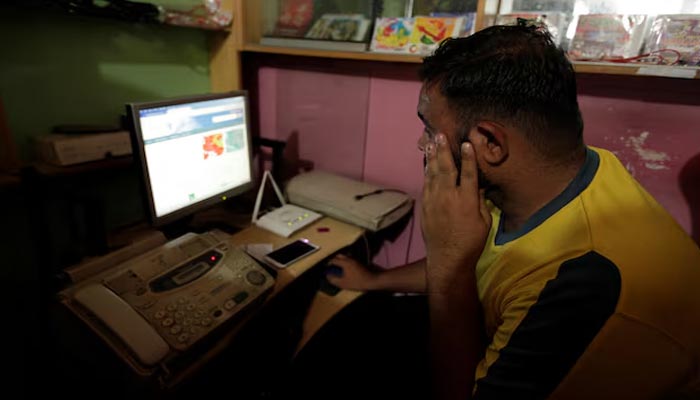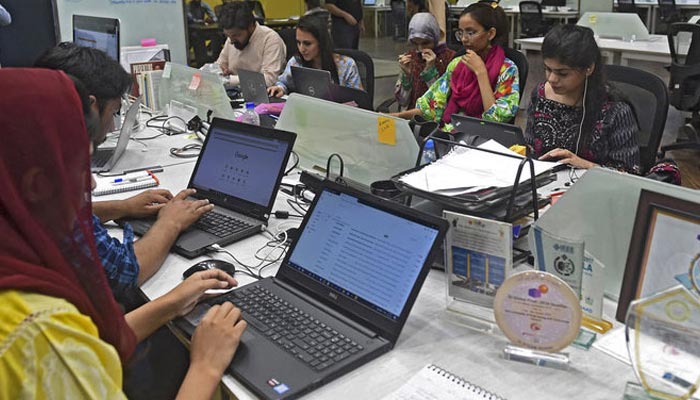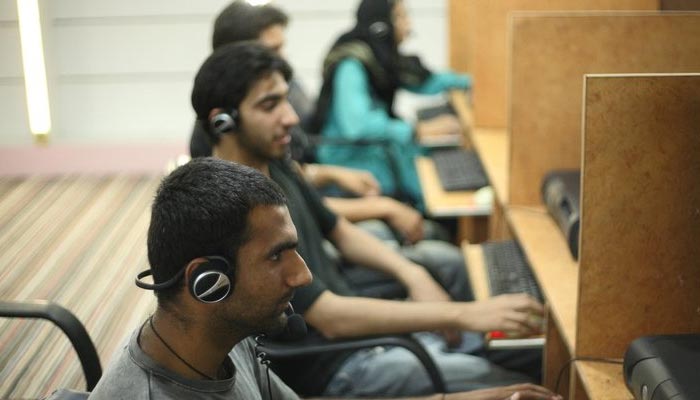Pakistani freelancers struggle as internet slowdown disrupts work
Internet users in Pakistan are facing slowdowns and partial outages affecting their online work drastically.
August 16, 2024

From losing long-term potential clients to being unable to access their Fiverr accounts, the freelance community in Pakistan has been heavily impacted by the ongoing internet disruptions as they struggle to make ends meet in the inflation-hit economy.
"We are all facing different issues and many people in the freelancing community lost their potential long-term clients. We were not able to send files or download ones sent to us over WhatsApp," a Pakistani freelancer told Geo.tv on the condition of anonymity.
Internet users across the country are facing slowdowns and partial outages, especially while using mobile data, with no explanation from the Pakistan Telecommunication Authority (PTA).
Users of the messaging application, WhatsApp, have also reported long delays and failure to send or download pictures or voice messages.

The government has also blocked access to X, formerly known as Twitter, since the February 8 elections citing national security concerns with netizens having to access the popular microblogging website with the help of VPNs (virtual private networks).
The issue of slow internet has been attributed to the alleged testing of an internet firewall to rein in social media which is equipped with filters that will block unwanted content from reaching a wider audience.
"Many of the people in the freelancing community lost their potential long-term clients who were paying them the hefty amount monthly, and some of them relied on it," lamented a freelance computer scientist.
He highlighted that many software houses in Pakistan were unable to deliver tasks on deadlines, leading to clients pulling off their orders.
"They told us that they would look for other better options and the internet outage is the main issue. They value the minutes even if they were posting media over socials or working on some product. Every update and the decided time matters," the Karachi-based freelancer said.
Business shifted to 'India and Bangladesh'
Faraz Ahmed, who has been freelancing for the past 10 years, said that his team — who provides services to those working on Amazon through remote desktop — has recently faced a lot of issues.
"Thousands of freelancers in Pakistan have faced trouble connecting the desktop due to internet disruptions. These were the freelancers who were working for foreign clients," Ahmed told Geo.tv.
He lamented that his business faced a loss of 30% within a week which shifted to India and Bangladesh. "The work that we used to complete in 15-20 minutes was stretched to six to seven hours. All our clients who were waiting got upset with us."
He added that there are hundreds of thousands of virtual assistants in Pakistan, who work from villages and small areas, are being massively impacted and may lose their jobs if the matter is not resolved.
'I will have to start from scratch'

Another freelancer, Muhammad Zubair, said he owned a "fresh account" on Fiverr and was earning around $1,000 in a month.
However, he said, that when he accessed the account through VPN, it was made temporarily unavailable.
"Later, my account was blocked and I am unable to access it. Everything is closed and I will have to make a new account and start from the scratch."
Geo.tv reached out to IT Minister Shaza Fatima but did not receive any response till the filing of this report.
'Suicidal policy' by govt
Usama Khilji, director of Bolo Bhi, an advocacy forum for digital rights, said the basic services are not available in Pakistan despite the Pakistan Muslim League-Nawaz (PML-N) government, saying that they are working to increase the IT exports and creating a "Nawaz Sharif IT city".
"WhatsApp, which is used for safe communication, is barely working and only text messages are going through. This shows how contradictory their (government's) positions are," he told Geo.tv.
Khilji said freelance platforms like Fiverr are suspending Pakistani freelancers' accounts because due to internet disruptions. "The IT industry, which was the only industry doing well in Pakistan's struggling economy, is also doing badly, not because of any other reason other than what the government is doing."
The Bolo Bhi director shed light on the firewall issue, saying that the government was doing it for "censoring more content and this is a suicidal policy by the PML-N government".
Khilji said this decision would have bad consequences for the economy, adding that this would lead to a higher exodus of young talented and skilled workers as "working in Pakistan is becoming increasingly difficult".
'Pakistan risks losing competitive edge in freelance market'
Wireless and Internet Service Providers Association of Pakistan (WISPAP) Chairman Shahzad Arshad, while speaking to Geo.tv, said the freelance community in Pakistan has found itself in an increasingly precarious position in recent few weeks.
"The government’s aggressive internet slowdown and the implementation of stricter firewalls have disrupted the flow of online work, directly affecting thousands of freelancers who rely on the internet for their livelihood."
Arshad stressed that the internet slowdown has hampered freelancers' ability to deliver work on time, participate in real-time meetings, and maintain consistent communication with clients, adding that the delay in loading pages, the inability to upload files swiftly, and the overall unreliability of the internet connection have resulted in missed deadlines and loss of client trust.
"The economic repercussions are severe. For a freelancer who earns on a per-project basis, a delayed submission can mean a direct financial loss. If this trend continues, Pakistan risks losing its competitive edge in the global freelance market. Potential clients may start looking elsewhere, fearing that working with Pakistani freelancers will result in inefficiencies and delays. This shift would lead to a reduction in the inflow of foreign currency, ultimately impacting the national economy," he told Geo.tv.

Speaking about the tech sector, Arshad said the companies in the tech industry rely on high-speed, reliable internet for everything from development to deployment, and when this is compromised, it directly affects productivity and innovation.
"Pakistan has the potential to become a regional tech hub, but this dream is at risk if the current internet issues persist. The slowdown stifles innovation, as startups struggle to maintain operations and deliver products on time. If the situation does not improve, we may see a brain drain, with the country’s top tech talent seeking opportunities abroad where the infrastructure supports their ambitions."
Arshad also said that freelancers now face the additional burden of ensuring that their communications and data are secure due to the firewall or surveillance.
"This added layer of complexity could discourage international clients from engaging with Pakistani freelancers, fearing that their data might be compromised. Although many governments around the world take measures for national interests its reliability and trust have a question mark," he added.
E-com, call centres face severe disruptions
Genetech Solutions COO Shamim Rajani spoke about the impact of internet slowdowns on Pakistan's digital economy, saying that recent weeks have seen a significant reduction in internet speeds across Pakistan, with decreases ranging from 30-40%.
"This has caused severe disruptions for key sectors such as e-commerce, call centres, and the broader online workforce. The ongoing issues have prompted the Pakistan Software Houses Association (P@SHA) to issue warnings that, if not resolved, the cumulative economic impact could soar to $300 million. Such losses would severely tarnish Pakistan's reputation as an emerging digital economy hub," she told Geo.tv.

Rajani said that the IT industry had, for several years, advocated for the development of a cluster-based ecosystem, specifically through the creation of Software Technology Zones (STZs).
"These zones would offer a centralised, secure environment conducive to business operations, including direct internet connections with satellite backups that bypass national traffic bottlenecks. Such infrastructure would not only facilitate seamless operations but also provide specialised monitoring to prevent misuse while ensuring uninterrupted access," explained Rajani.
She said that without these dedicated STZs, the Ministry of IT and Telecommunication (MoITT) currently faces significant challenges in differentiating between legitimate remote workers and potential digital threats, and thus unable to provide targeted solutions to mitigate the ongoing disruptions.









